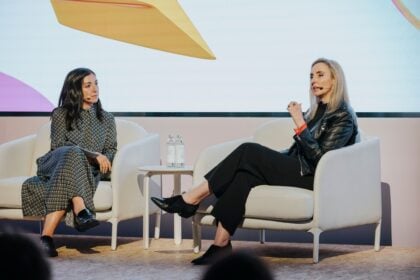Saatchi & Saatchi Australia’s chief creative officer Mandie van der Merwe, an “AI optimist” has issued a rallying call to the industry – if you remove human creativity from the creative process, and over-rely on AI technology, “you’re at risk of turning your powerful tools into brand killers”.
“What do I mean by brand killers? It’s generic, soulless content that’s a little bit tone deaf and can make you feel unsure. It’s also not culturally relevant and devoid, most importantly, of a brand’s tone of voice,” she said at the Meta Festival in Sydney this week, which largely focused on the positive impacts of AI in advertising.
She warned that if everyone had access to the same tech stack and “AI littered” similar mediocre creative, it could create a somewhat dystopian future for a brand.
Van der Merwe is an award-winning creative who has worked on campaigns for Tourism Australia, Fox Sports, Nando’s, Tourism New Zealand, David Jones and Virgin Money. This includes iconic campaigns such as Tourism Australia’s ‘MateSong’ (at M&C Saatchi) and Go Gentle Australia’s ‘Stop the Horror’ (at Cummins & Partners, see video below).
An AI optimist
Although she issued caution about over-relying on AI technology and using machines to replace humans, she remains a self confessed “AI optimist”.
“I’m excited for the future because it allows me to spend more time doing what I enjoy, which is thinking about ideas, understanding humans, coming up with real insights and figuring out how I can connect,” she said.
She said that AI technology, used correctly, should “kill slow and belated ways of working”.
“I also suspect the power will shift from who makes the most to who makes it matter the most,” she added.
Responding to a question about whether ‘AI will kill creativity’, she emphatically answered ‘no’, reminding the audience that calls for the ‘death of advertising’ come about every time there is a major technological shift (remember when the Adobe creative suite threatened to kill art director roles?).
“Creativity is a choice–just like I chose to put on these shoes today–you can choose to embed creativity in everything that you do to avoid going to dystopia where your brand doesn’t have a soul or a voice.
“We’ll use AI for scale and creativity for soul. And I see clients working together as co-authors. So for me, that’s not just the future of storytelling, that’s the future of brand building.
“We are not inheriting stuff, we’re creating the future, and I find it exciting.”

Human + machine
Van der Merwe was joined on stage by Meta creative lead Stefanie Digianvincenzo, another storied creative who has previously worked at Google, Cotton On, Clemenger BBDO, AKQA and a host of other agencies, said that theme throughout the Meta Festival is that “you just can’t take the human out of the process”.
She said: “The future is going to be the human plus machine. That’s kind of the best scenario. We say creative will be automated, but creativity never will be.
“You can’t just go out with one message or one version of an idea anymore. Within a campaign there has to be lots of different expressions and manifestations of your big idea, which I think puts more pressure on the big idea.”
Digianvincenzo believes that paranoia in the creatives industry has been subsiding in the past year and more creatives are now embracing the power of AI as an enabler.
One industry leader that is on board is Leonardo.Ai senior creative technologist Jessie Hughes who described generative AI as the same as the “the birth of the internet” and the “next era of human intelligence”.
Leonardo.ai is an AI image generation company that has 30 million users was acquired by Canva last year and competes with the likes of OpenAI’s DALL-E, Midjourney, Scenario and Stable Diffusion.
Hughes said that Generative AI tools such as these allow users to have “creative control of the outcome’ and that she also uses them to help inspire ideation.
She added: “2024 was the year of photo realism, 2025 is about video and motion, and it’s happening really fast.”





































